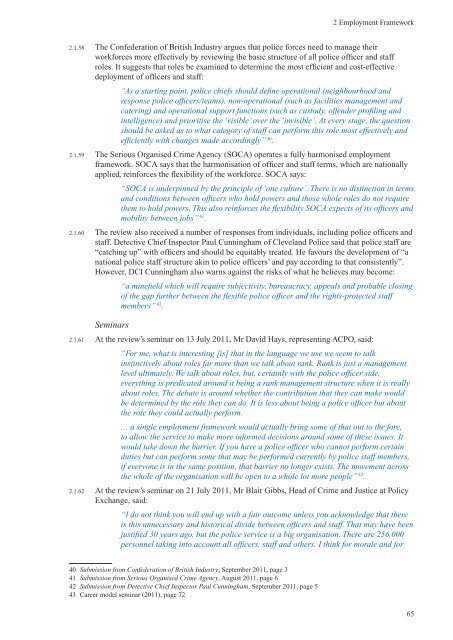Independent Review of Police Officer and Staff Remuneration and ...
Independent Review of Police Officer and Staff Remuneration and ...
Independent Review of Police Officer and Staff Remuneration and ...
Create successful ePaper yourself
Turn your PDF publications into a flip-book with our unique Google optimized e-Paper software.
2 Employment Framework<br />
2.1.58 The Confederation <strong>of</strong> British Industry argues that police forces need to manage their<br />
workforces more effectively by reviewing the basic structure <strong>of</strong> all police <strong>of</strong>ficer <strong>and</strong> staff<br />
roles. It suggests that roles be examined to determine the most efficient <strong>and</strong> cost-effective<br />
deployment <strong>of</strong> <strong>of</strong>ficers <strong>and</strong> staff:<br />
“As a starting point, police chiefs should define operational (neighbourhood <strong>and</strong><br />
response police <strong>of</strong>ficers/teams), non-operational (such as facilities management <strong>and</strong><br />
catering) <strong>and</strong> operational support functions (such as custody, <strong>of</strong>fender pr<strong>of</strong>iling <strong>and</strong><br />
intelligence) <strong>and</strong> prioritise the ‘visible’ over the ‘invisible’. At every stage, the question<br />
should be asked as to what category <strong>of</strong> staff can perform this role most effectively <strong>and</strong><br />
efficiently with changes made accordingly” 40 .<br />
2.1.59 The Serious Organised Crime Agency (SOCA) operates a fully harmonised employment<br />
framework. SOCA says that the harmonisation <strong>of</strong> <strong>of</strong>ficer <strong>and</strong> staff terms, which are nationally<br />
applied, reinforces the flexibility <strong>of</strong> the workforce. SOCA says:<br />
“SOCA is underpinned by the principle <strong>of</strong> ‘one culture’. There is no distinction in terms<br />
<strong>and</strong> conditions between <strong>of</strong>ficers who hold powers <strong>and</strong> those whole roles do not require<br />
them to hold powers. This also reinforces the flexibility SOCA expects <strong>of</strong> its <strong>of</strong>ficers <strong>and</strong><br />
mobility between jobs” 41 .<br />
2.1.60 The review also received a number <strong>of</strong> responses from individuals, including police <strong>of</strong>ficers <strong>and</strong><br />
staff. Detective Chief Inspector Paul Cunningham <strong>of</strong> Clevel<strong>and</strong> <strong>Police</strong> said that police staff are<br />
“catching up” with <strong>of</strong>ficers <strong>and</strong> should be equitably treated. He favours the development <strong>of</strong> “a<br />
national police staff structure akin to police <strong>of</strong>ficers’ <strong>and</strong> pay according to that consistently”.<br />
However, DCI Cunningham also warns against the risks <strong>of</strong> what he believes may become:<br />
Seminars<br />
“a minefield which will require subjectivity, bureaucracy, appeals <strong>and</strong> probable closing<br />
<strong>of</strong> the gap further between the flexible police <strong>of</strong>ficer <strong>and</strong> the rights-protected staff<br />
members” 42 .<br />
2.1.61 At the review’s seminar on 13 July 2011, Mr David Hays, representing ACPO, said:<br />
“For me, what is interesting [is] that in the language we use we seem to talk<br />
instinctively about roles far more than we talk about rank. Rank is just a management<br />
level ultimately. We talk about roles, but, certainly with the police <strong>of</strong>ficer side,<br />
everything is predicated around it being a rank management structure when it is really<br />
about roles. The debate is around whether the contribution that they can make would<br />
be determined by the role they can do. It is less about being a police <strong>of</strong>ficer but about<br />
the role they could actually perform.<br />
… a single employment framework would actually bring some <strong>of</strong> that out to the fore,<br />
to allow the service to make more informed decisions around some <strong>of</strong> these issues. It<br />
would take down the barrier. If you have a police <strong>of</strong>ficer who cannot perform certain<br />
duties but can perform some that may be performed currently by police staff members,<br />
if everyone is in the same position, that barrier no longer exists. The movement across<br />
the whole <strong>of</strong> the organisation will be open to a whole lot more people” 43 .<br />
2.1.62 At the review’s seminar on 21 July 2011, Mr Blair Gibbs, Head <strong>of</strong> Crime <strong>and</strong> Justice at Policy<br />
Exchange, said:<br />
“I do not think you will end up with a fair outcome unless you acknowledge that there<br />
is this unnecessary <strong>and</strong> historical divide between <strong>of</strong>ficers <strong>and</strong> staff. That may have been<br />
justified 30 years ago, but the police service is a big organisation. There are 256,000<br />
personnel taking into account all <strong>of</strong>ficers, staff <strong>and</strong> others. I think for morale <strong>and</strong> for<br />
40 Submission from Confederation <strong>of</strong> British Industry, September 2011, page 3<br />
41 Submission from Serious Organised Crime Agency, August 2011, page 6<br />
42 Submission from Detective Chief Inspector Paul Cunningham, September 2011, page 5<br />
43 Career model seminar (2011), page 72<br />
65

















